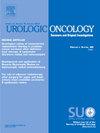Locations of metastases in and oncological outcomes of patients with metastatic castration-sensitive prostate cancer: Real-world data from a multicenter study
IF 2.4
3区 医学
Q3 ONCOLOGY
Urologic Oncology-seminars and Original Investigations
Pub Date : 2025-05-01
DOI:10.1016/j.urolonc.2025.02.007
引用次数: 0
Abstract
Background
Androgen receptor-signaling inhibitors (ARSIs) have significantly changed the preferred treatments for metastatic castration-sensitive prostate cancer (mCSPC). Despite such advances, the prognostic significance of metastases at specific sites remains unclear. This study evaluated how metastatic site affected the oncological outcomes of mCSPC patients.
Methods
This retrospective multicenter study included 716 mCSPC patients receiving androgen- deprivation therapy (ADT) alone, combined androgen blockade (CAB) therapy, or both ARSI and ADT (ARSI doublet) from February 2018 to June 2023. All patients were categorized based on their metastatic sites. The primary endpoint was the time to castration-resistant prostate cancer (CRPC) development; the secondary endpoints were progression-free survival 2 (PFS2), cancer-specific survival (CSS), and overall survival (OS). Kaplan-Meier curves and multivariate Cox's regression models were used to analyze the survival outcomes. We stratified mCSPC patients with bone metastases by the volumes of such metastases and lung metastasis status, and explored the clinical significance of lung metastasis.
Results
Patients with lung-only metastases experienced better outcomes than those with other visceral metastases. On multivariate analysis, the bone metastasis volume, but not lung metastasis status, significantly affected CRPC-free survival status. No significant difference in any of CRPC, PFS2, CSS, or OS status was apparent among patients with bone metastases with or without lung metastases. In terms of interaction, lung metastasis did not significantly affect the prognoses of patients with either low- or high-volume bone metastases.
Conclusion
In the present era of ARSI doublet therapy, lung-only metastases in mCSPC patients were associated with favorable outcomes. The negative prognostic effects of lung metastases were much lower than was the bone metastasis volume, indicating that treatments targeting low-volume disease may be adequate even when lung metastases are apparent.
转移性去势敏感前列腺癌患者的转移部位和肿瘤预后:来自多中心研究的真实世界数据
背景:雄激素受体信号抑制剂(ARSIs)显著改变了转移性去势敏感前列腺癌(mCSPC)的首选治疗方法。尽管取得了这些进展,但在特定部位转移的预后意义仍不清楚。本研究评估了转移部位如何影响mCSPC患者的肿瘤预后。方法:本回顾性多中心研究纳入了2018年2月至2023年6月期间接受雄激素剥夺治疗(ADT)、雄激素阻断(CAB)联合治疗或ARSI和ADT (ARSI双重治疗)的716例mCSPC患者。所有患者均根据其转移部位进行分类。主要终点是去势抵抗性前列腺癌(CRPC)发展的时间;次要终点为无进展生存期2 (PFS2)、癌症特异性生存期(CSS)和总生存期(OS)。采用Kaplan-Meier曲线和多变量Cox回归模型分析生存结局。我们根据骨转移的体积和肺转移情况对mCSPC患者进行分层,并探讨肺转移的临床意义。结果:仅肺转移的患者比其他内脏转移的患者预后更好。在多因素分析中,骨转移的体积,而不是肺转移的状态,显著影响无crpc的生存状态。在伴有或不伴有肺转移的骨转移患者中,CRPC、PFS2、CSS或OS状态均无明显差异。在相互作用方面,肺转移对低体积或高体积骨转移患者的预后没有显著影响。结论:在目前ARSI双重治疗的时代,mCSPC患者仅肺转移与良好的预后相关。肺转移对预后的负面影响远低于骨转移量,这表明即使肺转移明显,针对小体积疾病的治疗也可能是适当的。
本文章由计算机程序翻译,如有差异,请以英文原文为准。
求助全文
约1分钟内获得全文
求助全文
来源期刊
CiteScore
4.80
自引率
3.70%
发文量
297
审稿时长
7.6 weeks
期刊介绍:
Urologic Oncology: Seminars and Original Investigations is the official journal of the Society of Urologic Oncology. The journal publishes practical, timely, and relevant clinical and basic science research articles which address any aspect of urologic oncology. Each issue comprises original research, news and topics, survey articles providing short commentaries on other important articles in the urologic oncology literature, and reviews including an in-depth Seminar examining a specific clinical dilemma. The journal periodically publishes supplement issues devoted to areas of current interest to the urologic oncology community. Articles published are of interest to researchers and the clinicians involved in the practice of urologic oncology including urologists, oncologists, and radiologists.

 求助内容:
求助内容: 应助结果提醒方式:
应助结果提醒方式:


